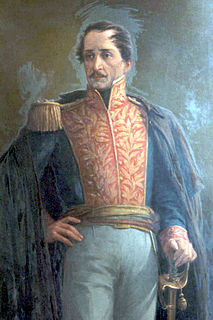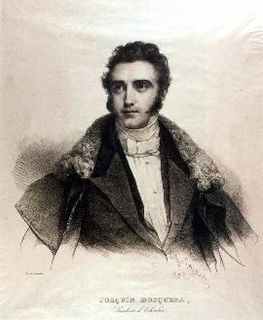
An electoral college is a set of electors who are selected to elect a candidate to a particular office. Often these represent different organizations, political parties, or entities, with each organization, political party or entity represented by a particular number of electors or with votes weighted in a particular way. The system can ignore the wishes of a general membership.
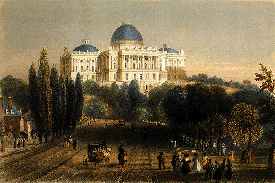
The Twenty-second United States Congress was a meeting of the legislative branch of the United States federal government, consisting of the United States Senate and the United States House of Representatives. It met in Washington, D.C. from March 4, 1831, to March 4, 1833, during the third and fourth years of Andrew Jackson's presidency. The apportionment of seats in the House of Representatives was based on the Fourth Census of the United States in 1820. Both chambers had a Jacksonian majority.
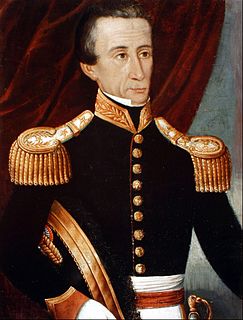
Francisco Antonio Pinto y Díaz de la Puente was a Chilean politician who served as President of Chile between 1827 and 1829.

Horacio Serpa Uribe is a Colombian lawyer, politician and current Senator of Colombia. Serpa has run as the Colombian Liberal Party candidate for President of Colombia on three occasions; in 1998, 2002, and 2006. He previously served as congressman for Santander as Senator, Inspector General of Colombia, president of the National Constituent Assembly, Minister of the Interior, and as Ambassador of Colombia to the Organization of American States. He was also involved in the 8000 process scandal in which money from the Cali Cartel entered the presidential campaign of Liberal candidate Ernesto Samper. In 2007 Serpa ran for the governorship of Santander Department and was elected on October, 28 in the Colombian regional elections.
The Chilean Civil War of 1829–1830 was an armed conflict between conservative Pelucones and liberal Pipiolos forces in Chile over the constitutional regime in force. This conflict ended with the defeat of the liberal forces and the approval of a new constitution in 1833, that was in force until 1925.

José Ignacio de Márquez Barreto was a Colombian statesman, lawyer and professor, who served as Vice President of Colombia under the presidency of Francisco de Paula Santander, and subsequently was elected President of the Republic of the New Granada for the presidential term of 1837 to 1841.

The constitutional history of Colombia is the process of formation and evolution of the different constitutions that Colombia has had since its formation.
The United States Senate elections of 1832 and 1833 were elections that had the Anti-Jackson coalition assume control of the United States Senate from the Jacksonian coalition, despite Andrew Jackson's victory in the presidential election.
"As Maine goes, so goes the nation" is a phrase that at one time was in wide currency in United States politics. The phrase described Maine's reputation as a bellwether state for presidential elections. Specifically, Maine's September election of a governor predicted the party outcome of the November presidential election in 19 out of the 26 presidential election years from 1832 to 1932, or 73 percent of the time. The accurate years were from 1832 through 1844, in 1852, from 1860 through 1876, in 1888, from 1896 through 1908 and from 1920 through 1932.

The 1832 United States presidential election in New Hampshire took place between November 2 and December 5, 1832, as part of the 1832 United States presidential election. Voters chose seven representatives, or electors to the Electoral College, who voted for President and Vice President.

The 1832 United States presidential election in New York took place between November 2 and December 5, 1832, as part of the 1832 United States presidential election. Voters chose 42 representatives, or electors to the Electoral College, who voted for President and Vice President.

The 1832 United States presidential election in South Carolina took place between November 2 and December 5, 1832, as part of the 1832 United States presidential election. The state legislature chose 11 representatives, or electors to the Electoral College, who voted for President and Vice President.
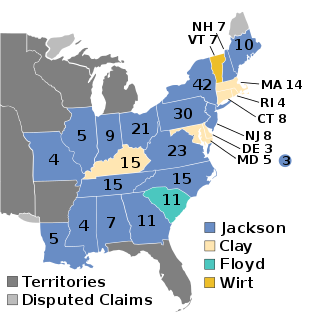
The 1832 United States elections elected the members of the 23rd United States Congress. Taking place during the Second Party System and a political conflict over the re-authorization of the Second Bank of the United States, the elections were contested between Andrew Jackson's Democratic Party and opponents of Jackson, including the National Republicans. Though the Democrats retained the presidency and the House, they lost their Senate majority. The Anti-Masonic Party also fielded the first notable presidential candidacy from a third party.

Presidential elections were held in Gran Colombia in 1825, with Congress certifying the results the following year. The result was a victory for Simón Bolívar, who received 582 of the 608 votes. Francisco de Paula Santander was elected Vice President.

Indirect presidential elections were held in the Republic of New Granada on 9 March 1932. Francisco de Paula Santander was elected president, whilst José Ignacio de Márquez was elected vice president.


